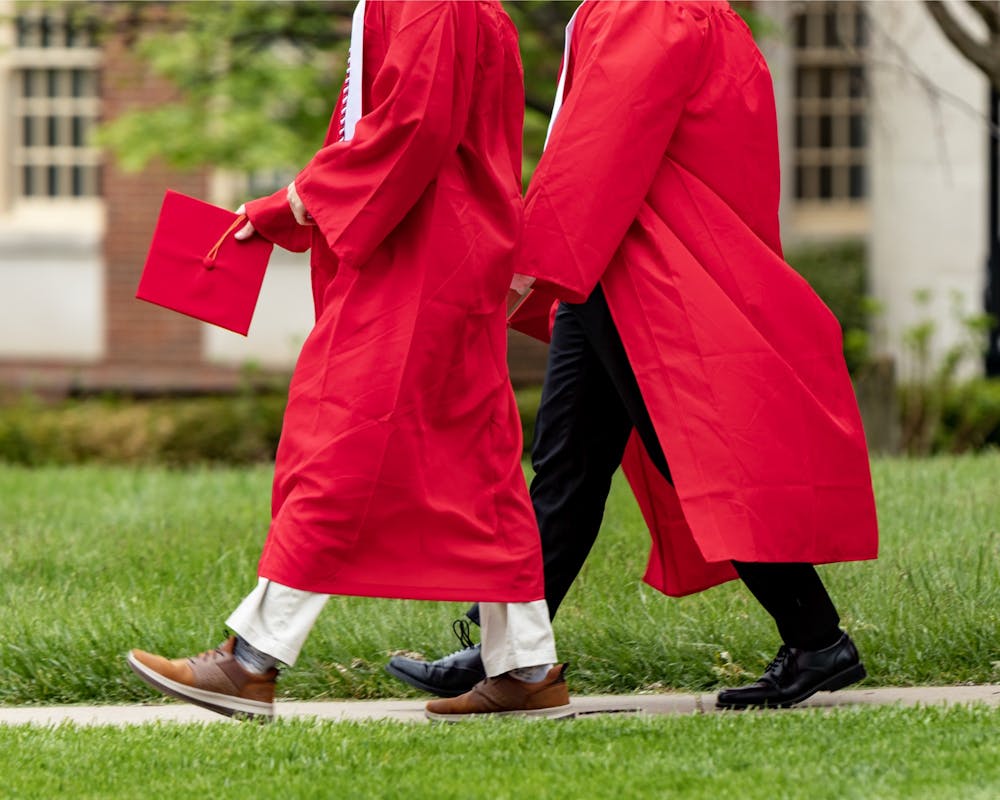For many students at Miami University, it’s easy to recount the trials that came with the COVID-19 pandemic: physical distancing, masks and contact tracing.
Usually students just beginning their college years associate the time with freedom, new friends and social experiences they’ll always remember.
Unfortunately, for many current Miami seniors, their experience was not what they expected.
Savana Colegate, a senior botany major, remembers how empty it felt to be on campus in a time where class was on Zoom and students had very little chance to interact with their peers or the campus.
“Everything was locked up. It was empty and sad,” Colgate said. “I think it’s a lot nicer now. It feels more human.”
Caden Wilcox, a senior Russian, East Europe, and Eurasian studies and economics double major, looked back on his experience on campus as a difficult time.
“The social element was definitely lacking,” Wilcox said. “It was often difficult for students to get that support network that being around other people gives. It’s more difficult to approach classwork and academics without having friends or acquaintances by your side.”
Wilcox wished the university had worked more for their students at the beginning, but noted it was difficult to navigate the new circumstances administration faced.
“I think Miami didn’t take the pandemic seriously at first, and because they lacked that seriousness at the beginning, the effects were more longstanding,” Wilcox said. “I think their approach was disjointed, and they thought they could give the same experience, but that just wasn’t possible. Any attempt they made couldn’t give us what we needed.”
Colegate agreed that Miami did all they could, but she still felt her experience has improved without all the restrictions of the pandemic.
Despite what it may have felt like to students, Miami quickly began to plan their procedures after the shutdown in March 2020. Kimberly Vance, a director with the Center for Student Engagement, Activities, and Leadership, remembered how administration quickly got to work on what needed to be done for students when they returned.
“We started working over that summer in 2020, which was quite an activated time period,” Vance said. “We had to ask ourselves how to help students make their voices heard when they can’t get in a big group and do much. How do we address behavior amongst our groups that are impacted by this?”
Enjoy what you're reading?
Signup for our newsletter
In addition to the event planning and organizing that Vance and her team were doing, Vicka Bell-Robinson, director of Residence Life at Miami, and her team were also trying to keep students in the dorms engaged during this time.
“We did a lot of grab-and-go programs that semester to get students engaged,” Bell-Robinson said. “We would tell students to grab this and then take it someplace where you’re not around other people.”
Colegate remembered the activities during COVID as a nice reprieve from the monotony of procedures and protocols at the time.
“They had a lot of fun Zoom meetings and activities to attend,” Colegate said. “I know they weren’t in person, but they were lively and gave me something to look forward to.”
In creating such measures and changes to engagement on campus, there were longer-lasting effects that can still be seen today. Events like MegaFair, which was previously crammed into the Recreation Quad, became more spread out and held at Cook Field. Scheduling times for events like Miami Activities and Programming’s I Love You Beary Much became more commonplace, according to Vance.
Vance said the shift to events that involve advanced scheduling have stuck around even after restrictions were lifted because they helped with logistics.Even events like sorority recruitment, which Vance helps plan, saw lasting changes.
“If 10 years ago somebody had told me that you could run sorority recruitment on a Zoom webinar, I would’ve said no way,” Vance said. “We did learn how to do it, though, and even now we use some of those tactics like having potential new members submit videos.”
Even in the times of COVID-19, amongst confusion and questions, students were still able to enjoy their experience on campus and feel safe. Bell-Robinson recounted some of the numbers from a residence life survey.
“In December of 2020, 96% of students said they had a positive experience in their residence hall,” Bell-Robinson said. “Comparing that to 87% in 2018, I think students, despite the challenges, still felt like they had a place here.”
Despite the work put in by the administration, many students still felt left behind during this time.
“Living in the dorms during COVID was definitely a negative experience for me,” Wilcox said. “Digital college, while isolated, didn’t compare to what previous students had. It really challenged my mental and social health.”




